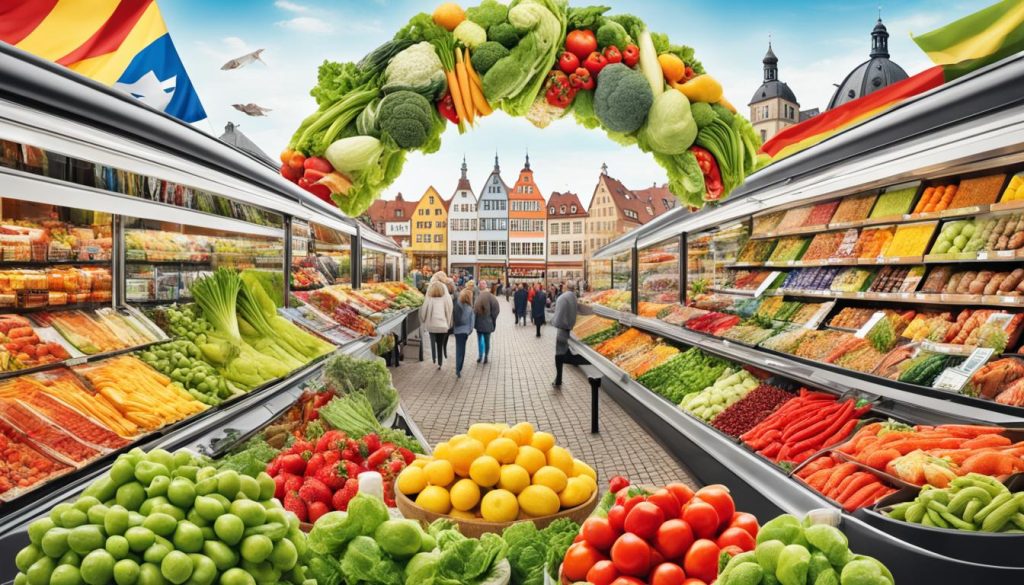Germany leads as the EU’s biggest consumer market, both in people and their buying power. It’s home to 83.2 million people, which is about 19% of the EU-27’s population. This means it is a major force in Europe when it comes to selling goods. Germany also boasts the largest economy in Europe, with a GDP of EUR 3,570 billion. This amount is nearly a quarter of the EU-27’s GDP. What’s more, the country has a high spending power of EUR 2,062 billion.
- Introduction to Germany’s Consumer Market
- The Significance of Germany’s Market Size
- Key Demographics in Germany’s Consumer Market
- Trends Shaping the German Consumer Market
- E-commerce and Digital Retailing in Germany
- Role of Trade Fairs in Germany
- Impact of COVID-19 on German Consumer Habits
- Germany’s Economic Landscape
- Germany’s Affluent Population and Spending Power
- Germany has the Biggest Consumer Market in the EU
- Insights into Consumer Behaviour in Germany
- The Role of Government Regulation in Germany’s Consumer Market
- Opportunities for UK Businesses in Germany
- Challenges Facing the German Consumer Market
- Future Outlook for Germany’s Consumer Iarket
- Source Links
Key Takeaways
- Germany holds the largest consumer market in the EU-27.
- Population: 83.2 million, approximately 19% of the EU-27 total.
- Highest GDP in Europe, at EUR 3,570 billion.
- Substantial purchasing power of EUR 2,062 billion.
- Influential player in the European consumer markets and the broader EU economy.
Introduction to Germany’s Consumer Market
Germany leads in studying the European consumer market. Its strong economy supports a vast market. With 83.2 million people, it is the EU’s biggest consumer market. This large market power drives many sectors, making Germany a key economic player in Europe.
Overview of the Market
Germany’s consumer market is large and varied. It offers a wide range of goods and services. These varied needs show in its high GDP, leading in Europe. This economic power makes the market very lively and attractive to local and foreign companies.
Population and Purchasing Power
Germany’s people play a big part in its market power. Its strong economy is thanks to the many residents who can afford to spend. This mix of many people who spend more makes Germany a top market in Europe. Its high GDP and income offer big chances for business.
The Significance of Germany’s Market Size
Germany’s big market greatly influences the EU, leading in economic power. Its size supports strong trade and investments, helping set economic standards across Europe.
Influence on European Economy
Germany is key in the EU economy, with a huge impact. Its large GDP and strong industrial base boost the EU’s economic health. This lets Germany push innovation and competition across the EU.
Comparison to Other EU Markets
Compared to others, Germany’s market is very influential. It has the EU’s highest GDP, which shows its crucial economic role. Because of its market size, Germany leads many EU economic trends and activities.
Key Demographics in Germany’s Consumer Market
The German consumer market is influenced greatly by two main groups. These are the Generation 50+ and younger consumers. They show us what they like to buy and what they look for in products. Marketers and businesses must pay attention to their preferences.
Generation 50+
The Generation 50+ group plays a big part in the market. They have a lot of money to spend. They like things of high quality. They prefer products and services they can trust. This group spends more on health, wellness, and leisure. They see these things as a luxury they can afford.
Young Consumers
Young consumers in Germany bring a fresh dynamic. They like finding new brands and good deals. They love what digital and social media bring to the table. This group looks for value and style but without high costs. Yet, when they truly like something, they stick with it. Their choices are smart and budget-friendly, showing their love for all things new and innovative.
Trends Shaping the German Consumer Market
The German market is changing, with people caring more about what they get for their money and who they buy from. This change shows shoppers are smart with their cash, choosing items that are both good and cheap. In simple terms, they look for value.
Value-for-Money Preferences
In Germany, shoppers want the best quality for their cash. They don’t want to spend too much. This has led to a trend where people carefully think about what they buy. They often choose brands that are both good and affordable. Businesses that sell top-notch stuff at fair prices do well because of this.
Brand Loyalty and Discount Retailers
Germans remain loyal to certain brands. But, they’re also open to buying from discount shops. There are stores that offer well-known goods at lower prices. This lets people buy what they like without overspending. So, they can stick to their favourites or shop smart, or even both.
E-commerce and Digital Retailing in Germany
The e-commerce growth in Germany stands out. It shows a big change in how consumer technology is welcomed. More and more, people in Germany enjoy shopping online. They like the ease and choice it brings.
The way we shop online is always changing. Stores are now using smart ways to offer what we like. They want our shopping to be just for us and easy wherever we are.
Today’s shops and online places support big shops and small ones too. They make an e-commerce world that is wide and strong, with room for everyone.
In Germany, being flexible and putting customers first is key. This makes their e-commerce story shine. And as shopping online grows, so will Germany’s market, with new and exciting things to come.
Role of Trade Fairs in Germany
Germany is known as a top spot for B2B events for good reason. Trade fairs go beyond just showing products. They serve as key places for getting to know others worldwide, sharing new ideas, and growing companies. This supports big trade deals and creates many new economic opportunities.
Top trade shows like Medica, the Hannover Fair, and Automechanika highlight Germany’s place in global trade. People from all over join these events. This makes Germany very important for companies looking to grow their business.
Trade shows in Germany are more than places to see products. They build a setting for businesses to meet and talk about industry trends, new tech, and future collaborations. Businesses use these chances to stand out in the market. This makes Germany key for international trade shows.
Impact of COVID-19 on German Consumer Habits
The COVID-19 pandemic has greatly affected how people in Germany shop. The virus posed a threat to jobs and the economy. To tackle this, the government offered aid to keep jobs stable.
This crisis led to changes in how Germans buy things. Many started buying more online. They also spent more on ways to entertain themselves at home, like games, and less on travelling or eating out.
This trend is likely to keep going, even as things get back to normal. The country’s service sectors are getting ready for a comeback. Yet, the path to full recovery might not be smooth.
Understanding these changes in shopping behaviour is key for businesses’ success. With new work styles and buying habits, Germany has shown it can adapt well. This shows the country’s economy is strong, even in hard times.
Germany’s Economic Landscape
Germany’s economy is very strong and helps the EU a lot. It’s the fourth-largest in the world. This shows its big impact on the EU and even further.
GDP and Economic Contributions
Germany keeps growing economically. It’s a key player globally because of its strong economy. This impacts markets close to home and far away.
Germany is at the front because of its many industries, ideas, and smart financial plans.
Trade Relationships and Partners
Germany is a big player in the world trading markets. It has a strong link with the U.S. Also, it’s the main trading partner in Europe for the U.S. This helps both countries grow together and keeps the global economy steady.
Being well-connected in the world market keeps Germany important worldwide.
Germany’s Affluent Population and Spending Power
Germany is at the top for affluent people with lots of money to spend. These folks have high disposable incomes. It makes their consumer market active and powerful. Their strong economy also helps boost the European market.
Disposable Income
Many Germans have a lot of money they can spend. This comes from a healthy economy. Such wealth lets people buy things from luxury items to daily essentials.
Consumer Confidence
Many Germans are not worried about their money. They have confidence in their economy and jobs. This makes them feel safe to buy big things. Their positive views keep their market strong.
Germany has the Biggest Consumer Market in the EU
Germany is seen as the leading consumer market in the EU. This is because of its large population and strong buying power. It stands as the biggest member state with a market size that outshines others.
The big market of Germany comes from its large population. This boosts the consumer spending. Coupled with a solid economy, it’s firmly at the top of the EU.
The Germans’ buying power is key to keeping their market strong. With lots of money to spend, they keep the market lively. This shows why Germany is the EU’s major market.
Germany’s market power is felt throughout Europe. It shapes consumer trends and spending habits within the EU. This shows how important Germany’s population and spending are for the EU’s market.
Insights into Consumer Behaviour in Germany
To understand German shopping habits, it’s key to know their unique choices. They value genuine and customised items when they shop. These preferences show in their buying decisions.
Individualistic Shopping Preferences
At the heart of Germany’s consumer scene is individualism. People there look for products that mirror their own values and way of life. This happens in all sorts of stores, with people favouring exclusive goods over common ones.
Demand for Quality and Sustainability
The desire for quality and green practices is on the rise in Germany. Folks want products that are top-notch and safe for the planet. This interest in eco-friendly items is a big part of Germany’s move towards more thoughtful buying.
The Role of Government Regulation in Germany’s Consumer Market
Germany’s consumer market is shaped by a special kind of economy. It mixes strong market ideas with a lot of government control. This influences social welfare and what people buy, which we’ll look into more.
Social Market Economy
In Germany, there’s a mix of capitalism and social care. This model aims for fair competition and to help society. The government’s rules make sure the market is fair and people live well. This keeps consumers safe and happy.
Impact on Consumer Spending
Government rules greatly affect spending in Germany. They use things like subsidies and benefits to keep people confident in spending. This system encourages people to buy by making things financially stable.
So, the market and government work together to keep the economy and social life strong.
Opportunities for UK Businesses in Germany
Germany is Europe’s biggest economy. It’s full of business opportunities for UK companies. To succeed here, you need to understand the UK-Germany trade and have a good market entry strategy.
High-Potential Sectors
There are key sectors with major potential. UK businesses might find success in areas such as:
- Cybersecurity: The need for strong cybersecurity is growing with more digital use.
- Digital Services: This area is always changing, offering chances for new digital ideas.
- Healthcare: Because many there are getting older, they need more medical tech and services.
Entering the German Market
To make it in Germany, you need a smart market entry strategy. Here’s how to start:
- Market Research: Know the market, what customers want, and the laws well.
- Local Partnerships: Working with local partners can help a lot with how things work and the culture.
- Adaptation: Changing your products or services to fit the local scene and rules is key to being welcomed.
By focusing on the top sectors and the right strategies, UK firms can really benefit in Germany. Doing well in Germany also helps UK-Germany trade grow stronger.
Challenges Facing the German Consumer Market
The German consumer market is facing serious challenges that could change its future. These issues come from many directions, both inside and outside Germany.
Labour Shortages
The nation is dealing with a big problem: not enough workers. This issue relates to an older population and not enough young people to work. As a result, businesses can’t find skilled people to hire. This hurts the economy and strains companies trying to keep up.
Inflation and Energy Prices
Inflation and heightening energy costs are shaking things up too. Inflation makes what we buy more expensive, making us spend less, hurting the whole market. Also, higher energy bills mean businesses spend more, and people’s expenses go up. These challenges make it hard for Germany to keep growing and staying stable.
Future Outlook for Germany’s Consumer Iarket
Germany’s consumer market’s future looks like a mix of good and tough times. It’s the biggest in Europe. People might spend more because they have more money and feel better about the economy.
But, there are risks too, like not enough workers and prices going up. This might slow things down.
The IMF says things will get better slowly. The government is also making smart plans. They aim to use new digital ways and help people spend wisely.
People are also thinking more about the environment and investing in good things. These choices might change the market’s future.
Germany faces tough challenges, but it’s good at finding new ways. Digital innovation and strong rules can help against the shaky economy. So, the
consumer market can still grow in a smart and positive way.















